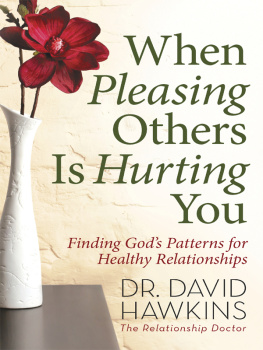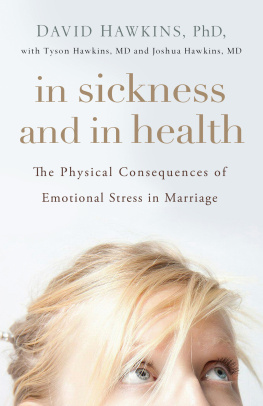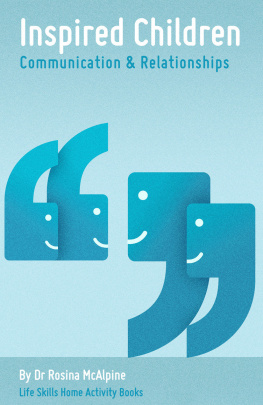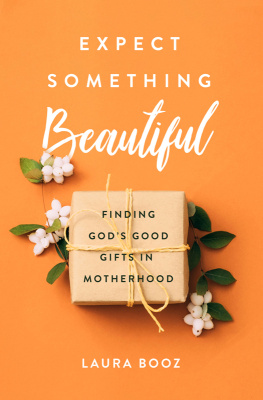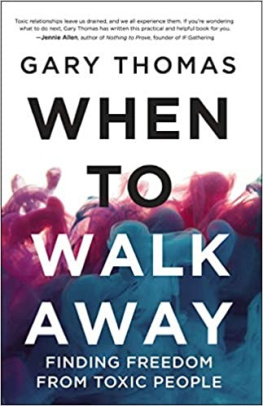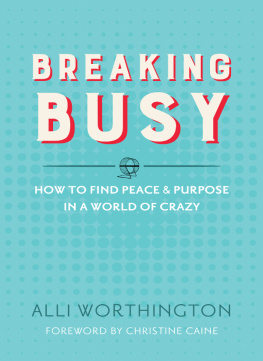
When
Pleasing
Others
Is Hurting
You
DR. DAVID
HAWKINS
The Relationship Doctor

Unless otherwise indicated, all Scripture quotations are taken from the HOLY BIBLE, NEW INTERNATIONAL VERSION.NIV. Copyright1973, 1978, 1984 by the International Bible Society. Used by permission of Zondervan. All rights reserved.
Verses marked TLB are taken from The Living Bible, Copyright 1971. Used by permission of Tyndale House Publishers, Inc., Wheaton, IL 60189 USA. All rights reserved.
Cover by Koechel Peterson & Associates, Inc., Minneapolis, Minnesota
This book includes stories in which the author has changed peoples names
and some details of their situations to protect their privacy.
WHEN PLEASING OTHERS IS HURTING YOU
Copyright 2004 by David Hawkins
Published by Harvest House Publishers
Eugene, Oregon 97402
www.harvesthousepublishers.com
Library of Congress Cataloging-in-Publication Data
Hawkins, David, 1951
When pleasing others is hurting you / David Hawkins.
p. cm.
ISBN 978-0-7369-2778-9 (pbk.)
1. Assertiveness (Psychology)Religious aspectsChristianity. 2. Christian life. I. Title.
BV4647. A78H39 2004
248.4dc22 2003022199
All rights reserved. No part of this publication may be reproduced, stored in a retrieval system, or transmitted in any form or by any meanselectronic, mechanical, digital, photocopy, recording, or any otherexcept for brief quotations in printed reviews, without the prior permission of the publisher.
Printed in the United States of America
10 11 12 13 14 15 16 17 / VP-MS / 10 9 8 7 6 5 4 3 2 1
This book is dedicated to the courageous men and women who struggle against the odds to set healthier boundaries that will create for them the life they have been called to live.
Acknowledgments
Completing a book is a huge project, and many helpful and encouraging hands are involved behind the scenes. I take responsibility for the final product, but my manuscript was improved by many able individuals. I would like to mention a few of them, knowing that I cannot name them all.
I would like to thank the entire family at Harvest House Publishersfrom the president of the company, Bob Hawkins, to the sales and marketing and editorial stafffor believing in this project and assisting me in creating the best book possible. Working closely with them to see this book to completion was challenging yet affirming, and I am thankful for the opportunity to work with so many wonderful people. Your books do make a difference!
More specifically, my personal editor, Gene Skinner, the guy assigned to me, has again been actively involved in strengthening the manuscript and encouraging me in my writing. His hand will often go unseen or unrecognized, perhaps even by me. But it is there nonetheless, building, enlivening, making a stronger, more powerful book. His name deserves to be on the cover with mine. Thank you, again, Gene.
I have again been fortunate to have Terry Glaspey, friend, able writer, and editor at Harvest House, as my personal champion of ideas. He knew, and said, this book needed to be written. Please know, Terry, that your encouragement is special to me.
On a day-to-day basis I must thank Christie and Jim again, who have critically yet tenderly read the manuscript, helping me find ways to enliven my writing and the message of this book. Writing a book is a time-consuming task, and the manuscript needed to be altered and strengthened in many ways. I want you both to know how invaluable your advice and suggestions are to me.
I am fortunate to have many other cheerleaders in my life. A few who have applauded the reluctant artist within are my sons, Joshua and Tyson, and friend, Judy. Thank you for affirming both me and my writing.
Finally, I want to thank the men and women I have worked with professionally (always disguised if used in any way in this book for anonymity) who have taught me the importance of being true to our unique nature. As I watch and listen to your stories I am amazed at your courage to learn new skills, set new boundaries, and search tirelessly for your true nature so that you can rise to new heights. I hope that my counsel has, in some small way, encouraged you to rediscover your true course.
Contents
Getting Lost
in Your Own
Backyard
People get lost every dayin mossy woods, in desert ravines, and in urban alleys. But the focus of this book is on those who get lost in the comfort of their own homes, in familiar everyday activities, in raising a family, working at a job, and being a wife and mother. More importantly, this book is about finding your way to a better relationship with God, with your spouse, and with yourself.
If you were to go hiking in uncharted territory, you would do well to take a compass to ensure that you found your way. Unfortunately, many people attempt to navigate the confusing terrain of relationships without help. They think they know where they are and where they are going, but they may not be aware of the perils along the way that can sidetrack them. They lack the emotional and spiritual guidance that can help them stay true to who God called them to be.
How can a person get lost in familiar surroundings? When Pleasing Others Is Hurting You will show you how you can unknowingly stray from the path you had set for yourself. For example, you can ignore your own emotions until you can no longer tell what you are feeling. You can ignore your preferences and eventually forget what is important to you. You may sacrifice your opinions for the opinions of others. You might value the advice of others over your own convictions and the voice of God.
Perhaps at one time you knew what was important in your life and sensed Gods calling for you, but very gradually you lost your direction. Bit by bit you gave up small parts of yourself by sacrificing traits that were important to you. You forfeited components of your identity to please someone else. In this sense you not only became lost but also lost important pieces of your personality. This process of losing yourself to win the approval of another person is called codependency.
Codependency Research
Researchers and counselors have studied the phenomenon of codependency for 20 years. They initially linked the condition to alcoholism and discovered that those who are married to alcoholics display some of the same traits as their addicted spouses even though they may have never taken a drink. In fact, people can take on the traits of those around them even in situations where alcohol is not involved. Certain individuals are chameleon-like, changing their needs and desires to fit the circumstances. If such a woman were with a controlling man, she might neglect her own well-being to keep her husband happy. If she had parents who were quarreling and needed peace in the home, she might ignore her needs to meet the demands of the moment in the family.
Codependency and the Scriptures
But are we not supposed to give up our needs to please others? Doesnt the Bible say to honor one another above yourselves? (Romans 12:10). Certainly we face tension when applying this scriptural advice. We feel the apparent contradiction and wrestle with it. We worry about thinking too highly of ourselves. Many of us try to lose ourselves for the sake of others and then, feeling exhausted and depleted, feel angry and guilty when we try to replenish ourselves in some meager way. We wonder how this advice could be meant for the overworked individual of the twenty-first century. How do we sacrifice ourselves and appropriately care for ourselves at the same time? Should we ever focus on how well we are doing?
Next page
